- Home
- Gore Vidal
Empire: A Novel Page 5
Empire: A Novel Read online
Page 5
Hay was conscious of the two men’s intent gaze, like a pair of predatory night birds in the forest. “Well,” said Hay, “late or soon, this is the bolt from the blue, isn’t it?”
“Surely,” said Adams, “you have something more memorable to say at such a time.”
A sudden spasm of pain made Hay gasp the word “Yes.” Then: “I could. But won’t.” But inside his head an aria began: Because, if I were to tell the truth I would have to confess that I have somehow managed to mislay my life. Through carelessness, I have lost track of time and now time is losing, rapidly, all track of me. Therefore, I cannot accept this longed-for honor because, oh, isn’t it plain to all of you, my friends and foes, that I am dying?
White was speaking through Hay’s pain: “… he would like you to be in Washington by the first of September so that Judge Day can then go to Paris for the peace conference with Spain.”
“I see,” said Hay distractedly. “Yes. Yes.”
“Is it too late?” Adams had read his mind.
“Of course it’s too late.” Hay managed to laugh; he got to his feet. Suddenly, the pain was gone: an omen. “Well, White, we have work to do. When in doubt about anything, Mr. Lincoln always wrote two briefs, one in favor, one opposed. Then he’d compare the two and the better argument carried the day, or so we liked to think. Now we’re going to write my refusal of this honor. Then we’re going to write my acceptance.”
Henry Adams stood up. “Remember,” he said, “if you don’t accept—and I think you shouldn’t, considering your age—our age—and health, you will have to resign as ambassador.”
“On the ground …?” Hay knew what Adams would say.
And Adams said it. “If you were just an office-seeker, it would make no difference either way. But you are in office. You are a man of state; and you are serious. As such, you may not refuse the President. One cannot accept a favor and then, when truly needed, refuse a service.”
Thus, the Adamses—and the old republic. Hay nodded; and went inside. All deaths are the same, he thought. But some are Roman; and virtuous.
– 3 –
CAROLINE had escaped what was left of the house-party in order to explore, alone, the woods below the house. As always, she was impressed by the stillness. No breeze stirred as she made her way between huge rhododendrons, their white flowers wilting, long past their season—dusty flowers, she thought, and wondered yet again why dust and its connotations, decay, should be so much on her mind just as she was about to spread her own wings at last and begin her flight through the long-awaited life that she had dreamed of. It must be her European childhood, she decided, that was ending, dustily, so that she, the oldest child on earth, might now become, brilliantly, the youngest woman.
A deer metamorphosed in a clearing at whose center was an attractive—to the deer at least—muddy pond. Caroline stood very still; hoped that the animal would come toward her; but the dark brown eyes blinked suddenly and where the deer had been there was now only green.
The problem of Del, she began to herself, contentedly. But the problem of Del was promptly replaced, like a magic lantern slide, by the problem of Blaise. Moodily, she sat on a log near the mud pond; was it England or Ireland that had no snakes?
When she had written Blaise that she was staying at Surrenden Dering, he had answered that he was more impressed than not; although Del Hay was “perfectly suitable,” a condescending fraternal phrase, she ought to meet a few more men first. He then filled a page with admiring references to “the Chief,” Mr. Hearst, and Caroline wondered if the actress-loving Mr. Hearst, still in his thirties and unmarried, might be Blaise’s candidate for her valuable hand. But then Blaise had suggested that after England she go back to Saint-Cloud and look after the old place until he was properly settled in New York. At the moment he was living in the Fifth Avenue Hotel, and that was hardly a proper home for a jeune fille de la famille. The rest of the letter was in French, rather the way their conversations tended to be; thoughts, too. He reminded her that the will was still making its leisurely way through probate and nothing would be decided before the first of the year. Meanwhile, although he hoped that she was enjoying her new status as an orphan in Paris, he recommended that she take on one or another of the numerous d’Agrigente old maids or widows as a duenna. “Appearances count for everything in this world,” he wrote, reverting to sententious English. But then Blaise should know. As a journalist, he was now a creator, an inventor of appearances.
“Caroline!” Del’s voice recalled her to the house. Del was standing on the lower terrace, waving a paper at her. “A telegram!” Suddenly, he was no longer standing on the terrace; he was sliding down it on his ample backside. “Damn!” he said, standing up. “Damn,” he repeated, looking at the grass stains on his handsome tweed. “Sorry,” he said; and smiled. He was attractive, she decided. If only a bit of the smooth fleshy lower face could be moved above the eyebrows; and the eyes themselves, perhaps, enlarged.
Caroline opened the telegram. It was from her cousin, and lawyer, John Apgar Sanford. Shortly before Colonel Sanford’s death, John had come to Saint-Cloud and he had said to Caroline, apropos nothing at all, “If anything should ever happen to your father, you’ll need a lawyer. An American lawyer.”
“You?”
“If you like.” At the time Caroline thought the possibility of her father’s death remote: Sanfords lived forever, enjoying to the full ill-health. But when the Blue Train had so abruptly transported Colonel Sanford prematurely to another plane, Caroline had written to John Apgar Sanford, to Blaise’s disgust: “Everything was all set. All arranged. Now you’ve gone and complicated things.” When Blaise had written her that the probate would not be settled until January, she had felt guilty. Plainly, she had complicated things. Now John Apgar Sanford urged: “Come to New York fastest will to be probated September fifteen don’t worry.”
“What is it?”
“I’ve been told not to worry—about something. I suppose that means I should be very worried.”
“Are you?”
Caroline put the telegram inside her reticule; and chose not to answer Del. “That poor telegraph lady in Pluckley. How busy we’ve all kept her!”
“She has asked Her Majesty’s Government for help. Otherwise, she says she will shut down.” Del smiled. “Come on. Uncle Dor’s brother, Brooks, has just arrived. He is something to see. And hear.”
Caroline took Del’s arm. “Can the embassy get me on a ship, to New York?”
“Of course. I’ll tell Eddy. When?”
“Tomorrow evening, if possible. Or the next day.”
“What’s happened?”
“Nothing. That is—nothing yet. It’s just business,” she added lightly, and paused for fear of stammering before the “b,” something she was prone to do when nervous.
Brooks Adams was holding court—no, she thought, more like a papal conclave—on the upper terrace. Brother Henry had so curled himself in a chair that he looked like a spineless porcupine, at bay. Henry James leaned against the nearby balustrade and studied the papal Adams with narrowed eyes. A plain little woman, Mrs. Brooks Adams, sat next to Mrs. Cameron, just out of range of her husband’s eccentric orbit; and it was an orbit that he was making as he waltzed excitedly … a pope with St. Vitus’ dance … about his seated older brother; yet of the two, Brooks, white of head and beard, looked the older. “Here they are,” the thin cultivated voice was inexorable, “the best of France, the military elite, brought into court, bullied, badgered, humiliated by a gang of dirty Jews.”
“Oh, no!” Caroline could not face another discussion of the case of Captain Dreyfus that had divided France for so long, boring her to death in the process. Even Mlle. Souvestre had lost her classical serenity when she defended the hapless Dreyfus to her students.
“Oh, yes,” murmured Del. “Mr. Adams’s rabid on the subject. So is Uncle Dor, but he’s less monotonous.”
Brooks Adams looked at the newcomers without interest
. Then he included them in his moving orbit. He resumed his crooked circumnavigation of the chair that held his brother. “Now you may say, suppose Captain Dreyfus is innocent of giving secrets to the enemy?”
“I should never say such a thing,” murmured Henry Adams.
Brooks ignored his brother. “To which I say, if he is innocent, so much the worse for France, for the West, to allow the Jew—the commercial interest—to bring to a halt—for nothing—a great power. England and the United States, the one decadent, and the other ignorant but educable—our task—to side with the Jew-interest, which, simultaneously, may save us in the coming struggle between America and Europe, which I have calculated should start no later than 1914, because there are only two possible victors—the United States, now the greatest world sea-power, and Russia, the greatest world land-power. Germany—too small for world power—will be crushed, and France and England will become irrelevant, and so that leaves us, facing vast ignorant Russia, dominated by a handful of Germans and Jews. But can Russia withstand us in her present state of development or non-development? I think not.”
Brooks Adams’s irregular ellipse now brought him face to face with his brother. “Russia must either expand drastically, into Asia, or undergo an internal revolution. In either case, this gives us our advantage. This is why we must pray for war now. Not the great coming war between the hemispheres.” Brooks’s odd circuit brought him to Henry James, who gazed like a benign bearded Buddha upon the febrile little man. “But the war to secure us all Asia. McKinley has made a superb beginning. He is our Alexander. Our Caesar. Our Lincoln reborn. But he must understand why he is doing what he is doing, and that is where you, Henry, and I and Admiral Mahan must explain to him the nature of history, as we know it …”
“I know absolutely nothing,” said Henry Adams, abruptly sitting up. “Except that I want my drive.”
“To Rye. With me,” said Henry James, moving away from the balustrade. “I go home,” he said to Mrs. Cameron. “I’ve invited your Henry—ah, and mine, too—for tea. We shall travel in a hired electrical-motor conveyance of local provenance.”
Henry Adams was calling. “Hitty! Hitty! Where are you?”
But Hitty, the niece Abigail, was not to be found. And so it was that in the interminable confusion of Henry James’s farewell, Henry Adams took Caroline’s arm. “I must have a niece of some sort with me, at all times. It is the law. You are chosen.”
“I am honored. But …”
There were no buts, as Henry Adams fled his brother Brooks, Caroline in tow, to be thrown, she thought, like dinner to wolves if Brooks were to draw too close to James’s rented troika or, to be precise, and James was nothing but that, electrical-motor car. At the last moment Del was included. Yet even in the driveway, to the astonishment of Mr. Beech, Brooks continued to hold forth as the uniformed chauffeur got the two Henrys, the one Del and the one Caroline into their high motor car.
“War is the natural state of man. But for what? For energy …”
“Oh, for energy!” simultaneously shouted Henry Adams, as the ungainly electrical-motor car, driven by the uniformed chauffeur, glided through the park, to the further astonishment of Mr. Beech—and of the deer. In the back seat Caroline and Adams faced Del and Henry James.
“I have never heard Brooks in such good and, may I say, abundant voice.” Henry James smiled the mischievous small smile that Caroline had come to find enchanting; although he missed nothing, he seemed never, as far as she could tell, to sit in judgment.
“He wears me out,” Adams sighed. “He is a genius, you know. Unfortunately, I am the genius’s hard-working older brother. So he comes to … to mine me, like an ore of gold, or more likely, lead. You see, I have a number of cloudy theories, which he makes into iron-bound laws.”
“Are there really laws to history?” asked Del, suddenly curious.
“If there were not, I wouldn’t have spent my life trying to be an historian.” Adams was tart; then he sighed again. “The only thing is—I can’t work them out properly. But Brooks can—to a point.”
“Well, what are they?” Yes, Del was genuinely curious, thought Caroline, and she was pleased because she was enough of a French woman to take pleasure, no matter how cursorily, in the elegant generality made flesh by the specific.
“Brooks’s law is as follows.” Adams stared off into the middle distance where, invisible for the moment, stood Hever Castle, which he had already shown Caroline and a raft of nieces. She thought of Anne Boleyn, who had lived there, and wondered if, when Henry VIII cut off her head, he was obeying a law of history which said, Energy requires that you now start the Reformation: or did he, simply, want a new wife, and a son?
“All civilization is centralization. That is the first unarguable law. All centralization is economy. That is the second—resources must be adequate to sustain the civilization, and give it its energy. Therefore all civilization is the survival of the most economical system …”
“What,” asked Del, “does most economical mean?”
“The cheapest,” said Adams curtly. “Brooks thinks that there is now a race between America and Europe to control the vast coal mines of China, because whichever power has the most and the cheapest energy will dominate the world.”
“But we have so much coal and oil at home.” Del was puzzled. “So much more than we know what to do with. Why go to China?”
“To keep others from going. But your instinct is right. If Brooks’s law holds, we shall have got—and won—everything.”
“Is this—dare one ask?—a good thing?” James was tentative.
“A law of nature is neither good nor ill; it simply is. If not us, Russia? Superstitious, barbaric Russia? No. If not us, Germany? A race given to frenzy—and poetry? No.”
“What then are we given to, that is so immeasurably superior?” James was staring, Caroline noticed, directly into Adams’s face—something he, with his endless tact, seldom did. He appeared to be reading Adams’s face, like a book.
“We are given to Anglo-Saxon freedom and the common law and …” Adams paused.
“And we are—extraordinarily and absolutely … we.” James smiled, without, Caroline thought, much pleasure.
“Surely in your love for England,” Adams delicately pricked his expatriate friend, “you must have found qualities here that you think superior to those of every other country—and you could have chosen to live anywhere, including our own turbulent republic. Well; then think of the United States as an extension of this country, which you do love and trust. So think of us as simply taking up the Anglo-Saxon radical task, shouldering it for these islands as they begin to lose their—economy.”
James spread his hands placatingly. “You speak of laws of history, and I am no lawyer. But I confess to misgivings. How can we, who cannot honestly govern ourselves, take up the task of governing others? Are we to govern the Philippines from Tammany Hall? Will we insist that our oriental colonies be run by bosses? Will we insist that our Spanish possessions be administered by the caucus which has made our politics so vile that every good American—and bad, too, let me hasten to add—cringes when he hears our present system mentioned?”
Adams frowned, not pleased. “We are in a bad way, it is true. But the England of Walpole was far more corrupt and narrow and provincial …”
“True. But the acquisition of an empire civilized the English. That may not be a law but it is a fact.” Henry James looked at Adams very hard. “But what civilized them might very well demoralize us even further.”
Adams did not answer. Del looked worried. “Have you talked like this to Father?”
James’s voice lightened. “No, no. Poor man. He has the weight of the world on him as it is. I think him noble beyond description to offer himself, at his age and in such—wintry health, on the altar of public service.”
Suddenly, James began to intone, the great organ notes quite filling the village through which they were passing. “ ‘He seen his duty, a dead s
ure thing. And went for it thar and then.’ ”
“What,” asked Caroline, alarmed, “is that?”
“From ‘Jim Bludso,’ ” said Del. “Father does hate to hear it.”
“Well, ‘Father’ is not here, and I do like the roll of it. What might he not have made, in his marvelously rhythmical chronicles, dedicated to the hazards of transportation, out of a runaway—let us say—electrical-motor car in which an historian and giver of immutable laws is saved from extinction by the swift strong arm of a mere storyteller from Albany, New York, but currently domiciled at Rye.…”
By the time that James had finished elaborating on this mock-Hay ballad, even Henry Adams was laughing.
Lamb House proved to be a miniature stone manor house with a garden in disarray, all weeds and, yes, dust, thought Caroline obsessively. At the door a man and woman greeted them.
“The Smiths,” said Henry James, with uncharacteristic brevity.
Joyously, the Master and his guests were greeted by the Smiths, who dropped his baggage repeatedly, as they hurried, swinging from side to side, into the house’s small drawing room.
“The Smiths are a legend,” whispered Del, as Henry James seated Henry Adams in an armchair next to the empty fireplace.
“Why?”
As if challenged to dramatize the legend, Mrs. Smith began to sink slowly, almost gracefully, to the floor, a gentle smile on her lips.
“Mr. Smith.” Henry James’s voice betrayed no agitation, as Mr. Smith, thus summoned, fell into the doorway from the hall. “Sir?” his voice rang out.

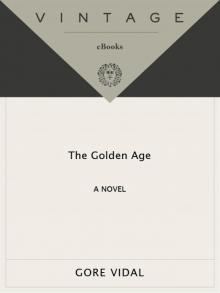 The Golden Age: A Novel
The Golden Age: A Novel Death Before Bedtime
Death Before Bedtime Burr
Burr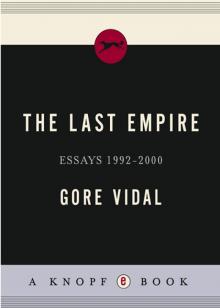 The Last Empire
The Last Empire Empire: A Novel
Empire: A Novel The Selected Essays of Gore Vidal
The Selected Essays of Gore Vidal Live From Golgotha
Live From Golgotha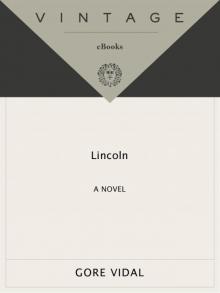 Lincoln
Lincoln Death Likes It Hot
Death Likes It Hot Thieves Fall Out (Hard Case Crime)
Thieves Fall Out (Hard Case Crime) Point to Point Navigation
Point to Point Navigation Williwaw
Williwaw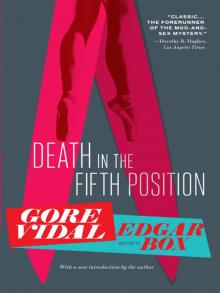 Death in the Fifth Position
Death in the Fifth Position In a Yellow Wood
In a Yellow Wood Julian
Julian Hollywood
Hollywood Myra Breckinridge
Myra Breckinridge Messiah
Messiah The Second American Revolution and Other Essays 1976--1982
The Second American Revolution and Other Essays 1976--1982 Homage to Daniel Shays
Homage to Daniel Shays Empire
Empire Thieves Fall Out
Thieves Fall Out 1876
1876 The City and the Pillar
The City and the Pillar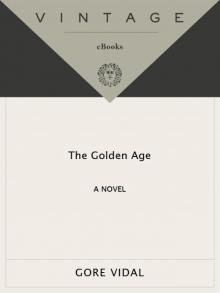 The Golden Age
The Golden Age At Home
At Home